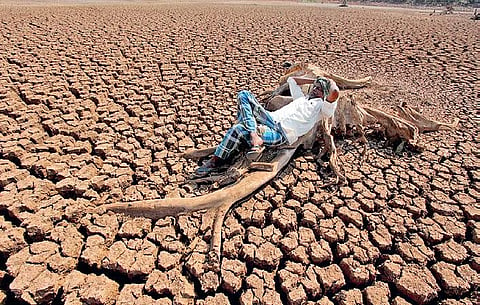Urgent call for Karnataka government action in face of looming farming crisis
Earlier this week, Rangaswamy, a farmer from Ajjanahalli in Challakere, dumped tomatoes he had grown on his two-acre land on the roadside. The hapless farmer’s desperate action hardly caught the attention of the powers that be. Even if it did, most of them would have dismissed it as a ‘routine’ practice when prices plummet.
Rangaswamy may have been forced to resort to such a severe measure due to price fluctuations, and the absence of storage facilities and processing units that would have helped millions of farmers like him. Yes, those are serious concerns that need to be addressed urgently. But that’s not all.
With 216 out of 236 taluks in the state declared drought-hit, the farm sector in the state is currently facing a serious crisis that requires urgent intervention by the state and Central governments.
If the state government’s assessment of the situation is anything to go by, the worst is yet to come. The Kharif food production target for 2023 was 111 lakh metric tonnes, but due to drought, it is expected to come down by 58 lakh metric tonnes — a 50 per cent decrease. Farmers’ yield will be reduced by over half and there is also a possibility of a shortage of food grains in the market.
The severe drought has damaged agricultural and horticultural crops in 41.52 lakh hectares and the loss is estimated to be over Rs 30,000 crore. This year the state is facing a “Green Drought.” That means though some fields may look lush green, the yield will be reduced significantly due to deficit rains.
To ease the burden to some extent, banks have been asked to restructure farmers’ loans. The Cabinet Sub-committee headed by Revenue Minister Krishna Byre Gowda seems to be doing a commendable job in getting the crop survey done to get a real assessment of the situation and present it before the Centre for seeking relief. As of now, the state has sought Rs 4,860 crore compensation under the National Disaster Relief Fund/ State Disaster Relief Fund norms. The Inter-Ministerial Central Team visited a few districts to assess the situation and give a report to the Centre, which then will release the funds.
The worsening power crisis has added to the woes. The government, which has doled out “up to 200 units” of free power to all households under the “Gruha Jyoti” guarantee scheme, has failed to provide a three-phase uninterrupted power supply to farmers, obstructing their efforts to protect crops by pumping water from borewells.
The Siddaramaiah government seems to be struggling to manage the power situation and is yet to start drought relief works. The blame game has already started. The ruling Congress is accusing the Centre of not giving time for the state ministers to meet Union Home and Agriculture Ministers to explain the situation and submit a memorandum seeking help. The opposition BJP is accusing the government of failing to rush to farmers’ assistance and instead, wasting time by pointing fingers at the Centre.
The political blame game will only intensify further ahead of the 2024 Lok Sabha polls. Be that as it may, they need to realise the urgent need to work as a team and rush to farmers’ aid. Noted economist and former director of the Institute of Social and Economic Change (ISEC), Prof RS Deshpande, is of the view that there is an urgent need to put money in the farmers’ hands now so they can start preparing for the Rabi cultivation. Any further delay could push farmers towards private money lenders.
Nearly 70 per cent of farmers in the state are small farmers and financial assistance from the government will help them significantly. But, it has to be done now. Instead of waiting for Central assistance, the State Government can give it immediately and recover it later.
Assisting with crop insurance, and providing crop loss compensation as per NDRF/SDRF norms; increasing the number of working days under the MGNREGA, and providing drinking water and fodder will have to be done without further delay. Our agricultural scientists should also focus more on drought-resistant crops, while the governments must ensure a market for farm produce.
While taking up the relief works, the authorities must focus on asset creation in villages, desilting of lakes, construction of recharge pits, building storage facilities, etc. Such measures can help farmers like Rangaswamy, who will be looking for storage and processing units for their produce. Alongside this, it will improve the overall agricultural ecosystem in villages.

